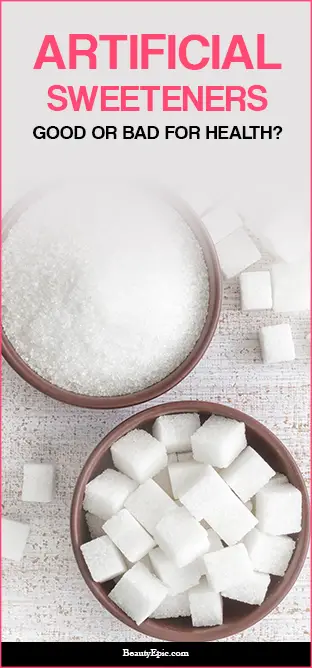
Important: This article is for informational purposes only. Please read our full disclaimer for more details.
Artificial sweeteners, commonly known as sugar-free, are a popular choice for individuals trying to lose weight as they contain much lesser food energy. But are they also free of health hazards? It’s a long going debate and in this post, we will discuss the pros and cons of using artificial sweeteners instead of sugar.
What are Artificial Sweeteners & How are They Produced?
Artificial sweeteners are chemically produced sugar additives. They provide the same taste as that of sugar while having significantly lesser calories. Also known as intense sweeteners, you need to add a very small amount of artificial sweetener as compared to sugar, as they are many times sweeter than sugar. Artificial sweeteners find their use in soft drinks and other beverages, puddings, jams and jellies, baked goods, candies, and dairy products. Artificial sweeteners are attained by manufacturing of plant extracts or through chemical processing.
Healthy Artificial Sweeteners
Here is a list of healthy artificial sweeteners that are found in nature, are low in calories and taste sweet.
1. Stevia: A low-calorie sweetener which is extracted from the leaves of Stevia rebaudiana, Stevia is known to lower blood pressure, regulate the blood sugar levels, and reduce plaque accumulation in the arteries.
2. Erythritol: A sugar alcohol found in certain fruits.
3. Xylitol: It is a sugar alcohol that improves bone density and is good for dental health.
4. Yacon Sweetener: Extracted from the yacon plant, it is a popular weight loss supplement and aids in digestive issues.
[ Read: Top 15 Probiotic Foods ]
Benefits of Artificial Sweeteners
Here are some of the advantages of using artificial sweeteners instead of sugar.
1. Tooth Problems
Artificial sweeteners do not erode the tooth enamel like sugar as it does not multiply the bacteria that adhere to the tooth surface. So if you are suffering from dental problems, you can try switching to low-calorie sweetener Xylitol which prevents plaque formation and tooth decay.
2. Glucose Metabolism
Since artificial sweeteners are not carbohydrates, they do not increase the blood glucose levels. Hence, people suffering from diabetes should consult their doctor for the use of artificial sweeteners and their recommended dosage to replace the sugar intake.
3. Reactive Hypoglycemia
Also known as sugar crash, individuals having reactive hypoglycemia will experience increased insulin levels immediately on absorbing glucose into their bloodstream. Therefore, such people usually avoid the intake of high-sugar foods and switch to artificial sweeteners for sugar taste.
4. Weight Control

Since artificial sweeteners contain no or very low-calories they are substituted for sugar by people trying to lose weight. Imagine a can of sweetened cola has about 160 calories which is a no-no for people trying to lose weight. Consider diet soda- it has zero calories, the choice is obvious for weight- conscious individuals.
[ Read: 26 Zero Calorie Foods ]
Bad Artificial Sweeteners List
Here is a list of the most popular artificial sweeteners that can have serious side effects and harmful implications on health.
1. Aspartame: It is 200 times as sweet as sugar and is used as a tabletop sweetener in frozen desserts, beverages, chewing gum, and gelatin.
2. Sucralose: A chlorinated sugar which is 600 times as sweet as sugar, Sucralose is the most commonly used artificial sweetener.
3. Neotame: Neotame is a moderately stable, quickly metabolized and an extremely potent sweetener.
4. Acesulfame Potassium: Also known as Ace-K, this artificial sweetener is 200 times as sweet as sugar and has a slightly bitter after taste like saccharin.
5. Saccharin: It was the first discovered artificial sweetener and is 300 to 500 times sweeter than sugar. Saccharin finds its use in dietary food, beverages, and toothpaste.
6. Advantame: This non-calorie sweetener finds its use in foods and beverages except meat and poultry.
Some other harmful sweeteners include Cyclamate, Sorbitol, Glucin, Mogrosides, and more. So how do these artificial sweeteners harm our health? Let’s find out.
Bad Health Effects of Artificial Sweeteners
1. Weight Gain

Studies have found a link between weight gain and the consumption of artificial sweeteners. The reason being that the artificial sweeteners are unable to satisfy the hunger and sugar cravings as they lack calories and make the person still feel hungry.
2. Cancer
Studies have linked the intake of artificial sweeteners like Aspartame with cancer. Saccharin has been linked to bladder cancer and its labels also carried warnings for a while. However, the National Cancer Institute and other health agencies have confirmed that usage of artificial sweeteners in limited amounts is safe.
3. Metabolic Disorders
while the consumption of artificial sweeteners is linked to metabolic disorders, there are no conclusive studies to establish this fact.
Artificial sweeteners are beneficial in managing blood sugar levels in people suffering from diabetes. But studies show that intake of diet soda increases the risk of developing diabetes by 6-12%. Artificial sweeteners do help with weight management and diabetes, however, more studies are needed in this field to draw an established conclusion.
You Might Also Like:
- 1200 Calorie Diet Plan For Weight Loss
- 20 Amazing Benefits And Uses of Buckwheat
- 1000 Calorie Diet Plan For Weight Loss
- 1200 Calorie Diet: Healthy Diet Plan for Quick Weight Loss
- Amazing 8 Fad Diets That Actually Work
- 10 Healthy Meals for Picky Eaters
- Monk Fruit vs. Stevia: Which Sweetener Should You Use?
- 7 Unexpected Side Effects Of Chewing Gum You Should Know
- Honey and Cinnamon Health Benefits: Both Combine
- 7 Healthy Homemade Drinks for Flat Tummy
- Top 12 Healthy Weight Loss Smoothies That’ll Help You Slim Down
- 50 Health Benefits of Red Rooibos Tea
- How to Use Honey for Weight Loss

















